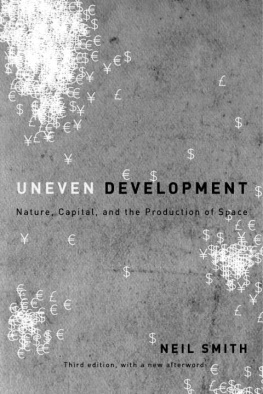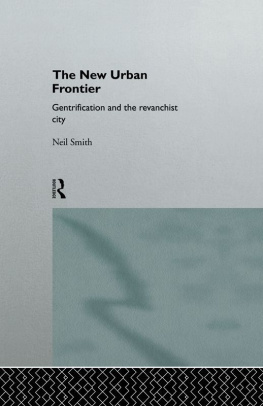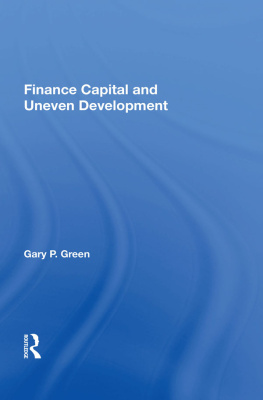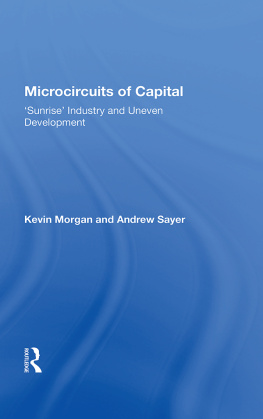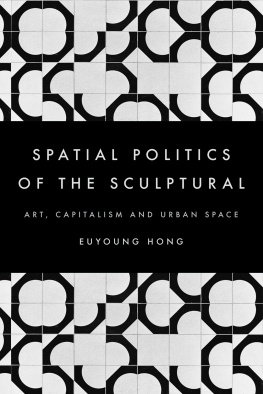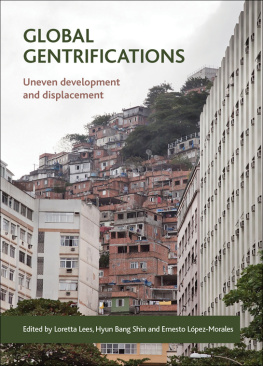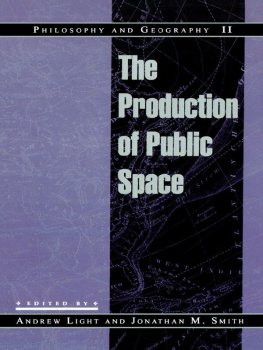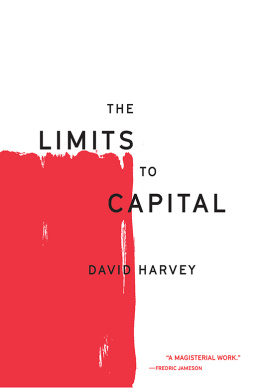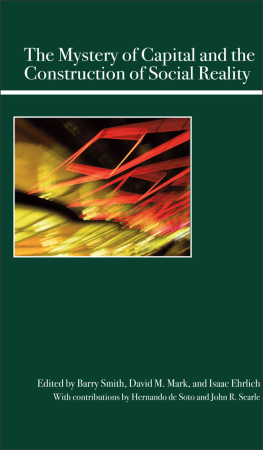Neil Smith - Uneven Development: Nature, Capital, and the Production of Space
Here you can read online Neil Smith - Uneven Development: Nature, Capital, and the Production of Space full text of the book (entire story) in english for free. Download pdf and epub, get meaning, cover and reviews about this ebook. year: 2009, genre: Science. Description of the work, (preface) as well as reviews are available. Best literature library LitArk.com created for fans of good reading and offers a wide selection of genres:
Romance novel
Science fiction
Adventure
Detective
Science
History
Home and family
Prose
Art
Politics
Computer
Non-fiction
Religion
Business
Children
Humor
Choose a favorite category and find really read worthwhile books. Enjoy immersion in the world of imagination, feel the emotions of the characters or learn something new for yourself, make an fascinating discovery.
- Book:Uneven Development: Nature, Capital, and the Production of Space
- Author:
- Genre:
- Year:2009
- Rating:3 / 5
- Favourites:Add to favourites
- Your mark:
- 60
- 1
- 2
- 3
- 4
- 5
Uneven Development: Nature, Capital, and the Production of Space: summary, description and annotation
We offer to read an annotation, description, summary or preface (depends on what the author of the book "Uneven Development: Nature, Capital, and the Production of Space" wrote himself). If you haven't found the necessary information about the book — write in the comments, we will try to find it.
Neil Smith: author's other books
Who wrote Uneven Development: Nature, Capital, and the Production of Space? Find out the surname, the name of the author of the book and a list of all author's works by series.
Uneven Development: Nature, Capital, and the Production of Space — read online for free the complete book (whole text) full work
Below is the text of the book, divided by pages. System saving the place of the last page read, allows you to conveniently read the book "Uneven Development: Nature, Capital, and the Production of Space" online for free, without having to search again every time where you left off. Put a bookmark, and you can go to the page where you finished reading at any time.
Font size:
Interval:
Bookmark:

NEIL SMITH



vii
xi
xv
i

THE REPUBLICATION OF Neil Smith's Uneven Development is cause for celebration on two counts. First, the book pioneered a wholly new approach to uneven geographical development at a historical moment when the collision of Marxian theorizing and geographical thinking was in its incipient but most fruitful and illuminating phase. It took someone with Smith's deep knowledge of and passionate commitment to both Marxian and geographical theory to pull off the merger of two so very different modes of thinking with such insight and panache. What Smith ended up doing, in effect, was to take seriously Lefebvre's assertion that capitalism has survived since the beginning of the twentieth century in large part through the production of space (and show theoretically why that has been and must be so) and explore its deeper and multiple intellectual and political meanings by accepting Alfred North Whitehead's view that "the determination of the meaning of na- ture"-including human nature-"reduces itself principally to the discussion of the character of time and the character of space." Smith did not start from these propositions. But that this was where he ended up after careful critical engagement with a whole host of competing ideas about capital, space, and nature, is undeniable. It is a tribute to this crucial insight that so many of us have continued to elaborate on this theme ever since. Uneven Development was, and continues to be, therefore, a foundational text of great historical significance, constantly worthy of reappraisal. It provides, as Edward Said noted in Culture and Imperialism, "a brilliant formulation of how the production of a particular kind of nature and space under historical capitalism is essential to the unequal development of a landscape that integrates poverty with wealth, industrial urbanization with agricultural diminishment."
But Said's commentary leads us directly to the second reason to applaud the reissue of Uneven Development. The unequal development of the global economy, with its burgeoning extremes of wealth and poverty, its astonishing pace of urbanization and environmental degradation, has accelerated rather than diminished over the quarter century since this book was first published. The political message of the book should, under such conditions, be doubly welcome simply because it is more relevant than ever to dissecting our present predicaments. Yet the penchant for tough critique in academia has notably waned over the years as the reputation of Marxian theorizing, of political-economic analysis, and of politically targeted critical geographical theory has been diminished not only by events (such as the end of communism) but also subject to dissolution in the tepid wash of identity politics and cultural theorizing. This so-called radical thinking amounts to thinly veiled apologetics for either doing nothing or offering mild support to either toothless communitarian oppositions or, even worse, covert neoliberalization.
When the widely held belief takes hold (in part promoted within hegemonic institutions such as the media and the universities, themselves subjected to neoliberal pressures and market determinations) that the answers to global poverty and environmental degradation lie in the extension of market logics and private property arrangements (everything from ridiculously inefficient as well as inegalitarian carbon-trading regimes to microcredit institutions that shamelessly prey on the poor) then there is precious little critical basis left for struggling to construct a more globally just social order. The ambition to ameliorate the worst abuses of neoliberal globalization and imperialism by human rights activism at best ameliorates and at worst ends up promoting the very ideals of neoliberal individualism and personal responsibility that lie at the root of our present difficulties.
Fortunately, there are social movements afoot around the world that insist that "another world is possible." And they are making plain their determination to construct that other world. But here, too, there is another barrier encountered to constructive politics, born out of the failures of so many traditional left movements to abandon their dogmatic assertions and their analyses constructed to confront a bygone era. While all of us concerned to build a better world need to rethink politics and ways of knowing in ways appropriate to our complicated contemporary geographical and historical situation, it is hard to do so within a climate of distrust for all forms of intellectual abstraction let alone the rigors of Marxian theorizing. But activists forget at their peril the advice long ago proffered by that great geographer Elisee Reclus to his anarchist comrades when, toward the end of a long life of struggle, he wrote: "Great enthusiasm and dedication to the point of risking one's life are not the only ways of serving a cause.... The conscious revolutionary is not only a person of feeling, but also one of reason, for whom every effort to promote justice and solidarity rests on precise knowledge.... Such a person can incorporate his personal ideas into the larger context of the human sciences, and can brave the struggle, sustained by the immense power he gains through his broad knowledge."
Neil Smith's Uneven Development is an essay in intellectual and political empowerment, a nondogmatic and wide-ranging inquiry into crucial aspects of the human condition, one that can still inspire and teach us much about that other world that is indeed possible. It deserves a careful reading and rereading. You will not be disappointed.
David Harvey

EARLY IN THE TWENTIETH CENTURY, students at Al Azhar University in Egypt went on strike. It was hardly a progressive movement; they were rebelling against the science of geography, which they rejected as much too innovative and a clear threat to established tradition. Their fears may have been real, but in the end were misfounded. During the twentieth century, the "science of geography" has attended to a gamut of ruling-class agendas in different national and international contexts, and yet by the late 197os, as global politics moved right, geography moved left. By the end of the 198os, as the rebellions grew in Eastern Europe, a U.S. state department official grabbed headlines with the desperate optimism that we were facing the "end of history"; American capitalism had won. In its ideological insulation from events non-American, this vision also assumes the end of geography. For the American Empire, if hardly for the oppressed and exploited around the world, news of this freezing of time and space may have come just in time. It presumably obviates any need to confront seriously the reasons and consequences of the fading American century and the deepening crisis of liveability for more and more people around the globe.
Font size:
Interval:
Bookmark:
Similar books «Uneven Development: Nature, Capital, and the Production of Space»
Look at similar books to Uneven Development: Nature, Capital, and the Production of Space. We have selected literature similar in name and meaning in the hope of providing readers with more options to find new, interesting, not yet read works.
Discussion, reviews of the book Uneven Development: Nature, Capital, and the Production of Space and just readers' own opinions. Leave your comments, write what you think about the work, its meaning or the main characters. Specify what exactly you liked and what you didn't like, and why you think so.

